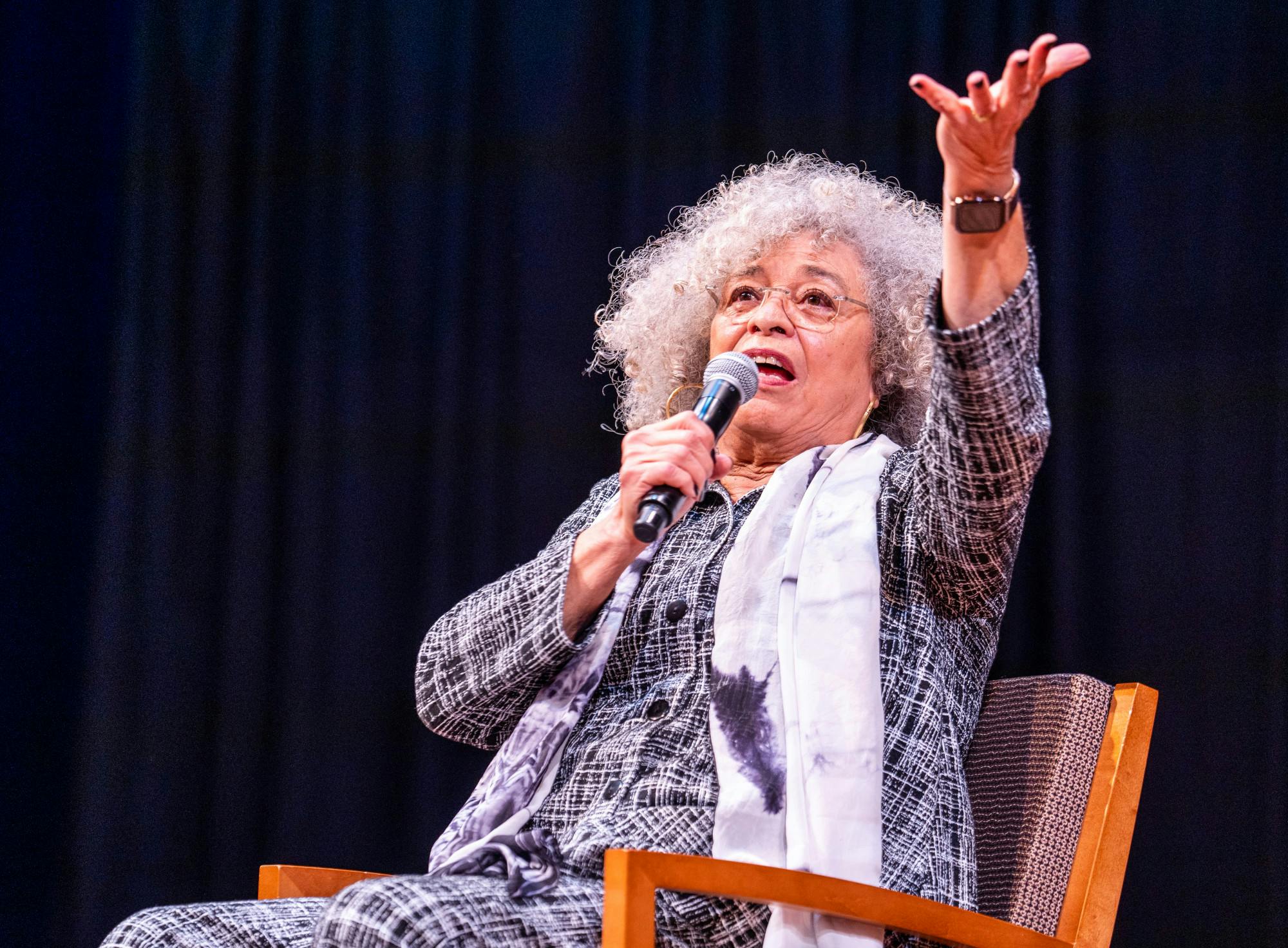Activist, author and educator Angela Davis spoke at the Wharton Center on Thursday as part of MSU's Slavery to Freedom lecture series. The series aims to celebrate Black history with art, speakers and events.
Davis, a prominent figure in the Black Power movement, began her speech by emphasizing the importance of honoring Black history.
“It is important to celebrate Black history, precisely because we're talking about the history of a struggle for freedom that has spanned centuries,” Davis said. “Anyone who loves freedom should celebrate Black History.”
Davis covered several topics during her speech, including issues of climate justice, police brutality, capitalism, the prison-industrial complex, intersectionality within activism and abolition.
Davis said the issue of climate justice is not just recognizing that marginalized communities are disproportionately affected by climate change, but to recognize that racism is core to the many processes that has led to "this horrendous failure" to recognize the role people have to play in preserving the environment.
“If we cannot manage to save this planet, then what difference will it make if we make strides in other areas?” Davis said.
Davis also spoke on how history recalls the Civil Rights movement of the 1960s.
“If you want to know who's responsible for the fact that the Civil Rights Movement evolved as it did, you will have to talk about Black women,” Davis said. “You will have to talk about Black women whose names you can't even retrieve. Poor Black women, you would have to talk about women who were domestic workers, who were the ones who made it possible for the Montgomery bus boycott.”
Davis said it is important to recognize that racism is a systematic ideology and calls for change in a “revolutionary manner." Racism, she said, it not foundationally about "not liking Black people.”
“Racism is an ideology, racism is a system. Don't assume that all you have to do is change the race of the actors and everything changes, that’s never been done. We have to transform, in a revolutionary manner, the way in which these institutions work,” Davis said.
Intersectionality within activism was also a prominent theme of the event. Davis talked about the importance of the language used by activists. When talking about Black freedom, she said, 19th century vocabulary can't be used because it was very masculine.
Davis's lecture brought the Pasant Theatre to full capacity. The audience was joined by 400 virtual participants viewing a live stream of the event.
The ‘Slavery to Freedom: an American odyssey’ lecture series presented by the College of Osteopathic Medicine as a part of MSU’s celebration of Black History Month. The series is in honor of Dr. William G Anderson, the first Black member and president of the American Osteopathic Association Board of Trustees.
Dr. Marley Dias, founder of the #1000BlackGirlBooks movement is also a participant of the series. The MSU College of Osteopathic Medicine is hosting a book drive aiming to collect 1,000 books featuring Black girls as the main characters.
Dias spoke at a Teen Empowering Event on Thursday, Feb. 2 at Waverly Middle School. She was joined by Grit, Glam and Guts, an organization that promotes teenage-girls to “gain higher self awareness, develop a healthy self-identity and recognize and engage in the power of their voice.”
Dias gave the keynote to begin the Slavery to Freedom lecture series on February 2nd. She has collected 13,000 books featuring Black girls as the lead, is author of the book "Marley Dias Gets It Done: And So Can You." She is also the executive producer of "Bookmarks: Celebrating Black Voices" on Netflix.
Freeman Hrabowski is speaking on Saturday, Feb. 25 at the Kellogg Hotel and Conference Center auditorium. Hrabowski is a former president of the University of Maryland and is a co-founder of the Meyerhoff Scholars program.
The Slavery to Freedom series has been sponsored by The College of Osteopathic Medicine for twenty-three years. Professor Reddog Sina said the series has grown in size since its founding.
“Dr. Anderson has, for a very long time, been bringing in people predominantly from the civil rights movement of last century.” Sina said. “Over the last ten years, it's gotten much larger. We've had huge crowds, plus, we have an online presence now, which is sort of an unintentional gift of the pandemic.”
Events from the ‘Slavery to Freedom’ lecture series are free to attend but require advance registration.
Support student media!
Please consider donating to The State News and help fund the future of journalism.
Discussion
Share and discuss “Angela Davis brings Pasant Theatre to full capacity for ‘Slavery to Freedom’ lecture series speech” on social media.






